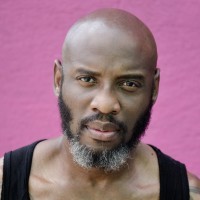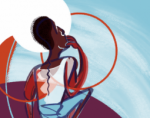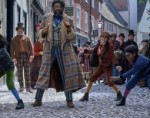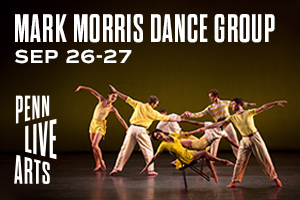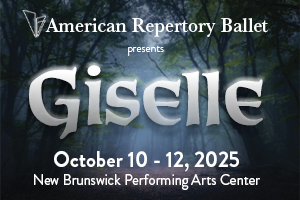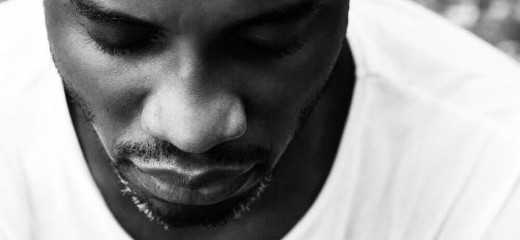
Where Do Our Dancing Black Boys Go to Cry?
by Gregory King
I am hyper-aware of my Blackness in all spaces. This vigilance I learned, and I perform it as a means of survival. For many Black folks, to survive is to be skeptical, to be alert, to be cognizant of their surroundings in order to avoid violence. It’s the type of violence that has been inflicted on us for over 400 years and is still a part of America’s wretched (his)story, with sexual violence percolating at the top. Yes, some Black people still carry fragments of the sexual violence perpetrated on us by slavery and colonialization.
In her recent article, Y’all Don’t Want To Talk About This But We Must: Sexual Abuse in Black and Brown Communities, Lorraine Avila reminds us that “Sexual trauma is a heavy generational inheritance to carry and yet somehow many of us —survivors and perpetrators— refuse to work on ways to kill it.”
The truth is, one out of every six Black boys is abused before the age of 16. These numbers, I believe, may be severely underreported knowing that some Black boys never report their abuse due to society’s patriarchal assertion of masculinity which denounces any kind of vulnerability boys may exhibit. This fosters a culture of silence. And silence against any kind of oppression is violent.
A frenzy erupted the day the news broke that Troy Powell, former artistic director of Ailey II, was fired for allegations of sexual harassment. This came after Instagram videos of former male dancers of The Ailey School surfaced, recounting inappropriate interactions with Powell during their time at the institution. They claimed predatory advances during their training at the institution, leaving them feeling preyed upon, powerless, and victimized. That same week, Terrence Greene, former dance instructor at Cleveland School of the Arts, was arrested due to accusations of sexual abuse dating back to 2008. Good, right? Hold on! Powell and Greene are finally being held accountable. What of the boys who were helpless in these encounters? What of the young men who stomached unwanted advances? Are our young Black men okay? Have they healed?
Let me be clear, this is not just about Powell and Greene: Administrators, teachers, and directors exerting sexual aggression towards underaged students is not only sadistically vicious, it’s criminal. This causes a type of wound that sometimes never heals.
Some young men have been brave enough to report inappropriate actions only to be hushed by bureaucracy. But this kind of politics protects the institution, and staff members who insist on ignorance or concealment are just as vile as those being abusive. When these arts organizations govern themselves, who holds them accountable? Powell and Greene may have been removed from their positions within these cultural institutions, but is that enough? What would be enough?
Black boys are being assaulted in dance spaces – not JUST Black boys, but Black boys.
Black boys are being assaulted in dance spaces – not JUST dance spaces, but dance spaces.
Dancing Black boys as young as 14, being preyed upon while some people knowingly stood by silently and did nothing.
Do you remember being 14? The onset of rebelliousness. Fervently heading towards being a responsible adult, never asking for guidance but clearly needing it. Awkwardly evolving into their newness, their own-ness with prideful curiosities. Knowing everything and nothing, relying on validation to boost their self-esteem, and existing with defiance to conceal their insecurities.
Who am I kidding? That’s not just 14 …. that’s at any age.
I didn’t start dancing until I was 18 years old, but I imagine those 14-year-olds, who unlike their male friends rushing off to more socially constructed male-approved extra-curricular activities, furtively explored their fondness of dance – sometimes without the support of parents. Dance filled them like it filled me later in life. And they danced despite societal expectation of how manhood should be performed, while suffering from imposter syndrome – not all of them, but some.
When I started dancing, dance felt like home. I was introduced to dance because someone saw my potential. Eventually, my introduction turned to curiosity, and my curiosities turned to joy. Before I knew it, I was dance itself. Dance spaces welcomed me, and for two hours out of every day I felt safe.
I am saddened and maddened by the reality that some of our young Black boys didn’t feel safe … and haven’t felt safe.
Our young Black dancers should receive praise for their talent and be made to feel special. But acknowledgment of their youthful enthusiasm and talent should never disrupt their childhood – it should never invoke indecency. They should never have to choose between their love of dance and their hate of a system that didn’t protect them from the eager advances of predators – a system that should have protected them.
Where do our young Black boys go when the system stays silent, when that silence traps them, making them suffer as they grow into young men?
There should only be one standard of acceptable behavior when dance students enter an office to report inappropriate interactions from your faculty or staff – you listen, support, investigate, and then take actions. And the responsibility should also extend to teachers who may not hold their administrators accountable. Our young Black boys don’t know where to turn. Dance parents, are we holding institutions accountable? Dancers, by attending classes as usual, we’re acquiescing to the culture of avoidance, erasure, and denial. Are we okay with our children going to a school that is complicit in sexual misconduct? Why is it easy to continue working in a place that will not even offer belated attempts to rectify the ways in which complaints from their students are handled? Our Black male dancers deserve more than muted and delayed outcry so we must be enraged.
We don’t have the privilege or luxury of neglecting those we are put in place to protect. One accusation from a student is cause for concern, but to ignore an avalanche of allegations is ghastly. Any administrator, dance teacher, or company director who knows of sexual assault, and works to bury or ignore inappropriate happenings in their organization, is complicit in the abuse. And because this abuse is attached to Black dancing bodies, we should all be infuriated by the anti-blackness it represents.
In addition to the sexual abuse, there is the intellectual abuse. The physical, psychological, and emotional abuse – a profusion of trauma abiding in the abyss of assault. When your mentor causes this, who do you tell? On what do you lean? Where do you go to cry? Our Black boys need not be confused. Not about life, not about dance. When they enter dance spaces they don’t only want to learn how to dance, they want to learn how to dance in a safe space. When this is not the case, we create communities of enablers, environments of distrust, spaces of toxicity, and the propagation of generational inheritance of sexual violence.
I hope that dance institutions will consider the implications of their silence and neglect in safeguarding structures of oppression. That which is allowed is encouraged.
Dance institutions cannot uphold a culture of secrecy that tolerates, and dare I say it, protects abusers. This cycle of abuse has to stop, and we must safeguard the places where our young Black boys and young Black men live, play, learn, and dance.
As communities continue to galvanize in the wake of countless innocent Black men and women being murdered, demanding accountability and shouting, “Black Lives Matter,” let’s not limit the conversation to some Black lives. There is an enormous temptation, and rightfully so, to march, mourning the lives of those violently killed. Tamir Rice and Trayvon Martin were Black boys who never grew up to be men. Our young Black boys deserve to experience their fullest joy; to bask in all their youthful imaginations; to dance. Think about their lives…their young Black lives, their young Black dancing lives. We must protect them because their Black lives matter.
By Gregory King
August 22, 2020

